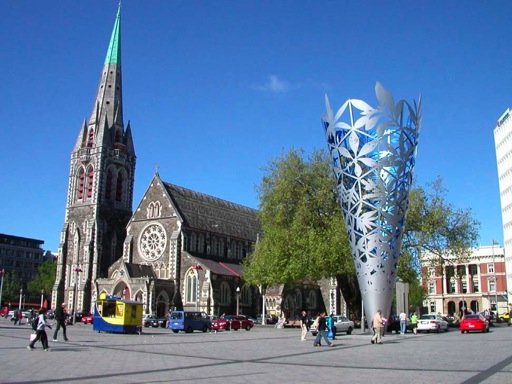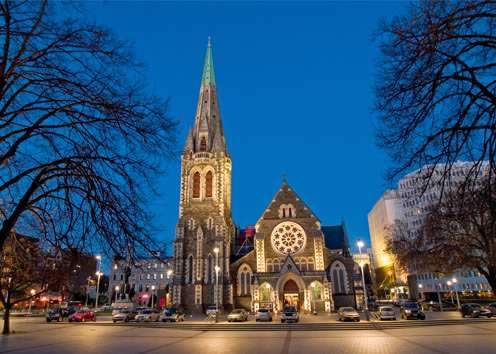- Study in AustraliaAustralian Universities/CollegesPrograms by faculty AusAustralian VisasLife in Australia
- Study In New ZealandNew Zealand UniversitiesPrograms by Faculty NZNew Zealand VisasLife in New Zealand
- Study in CanadaUniversities/Colleges in CANADAPrograms by faculty CanadaCanadian VisasLife in Canada
Christchurch
Christchurch
Christchurch is the largest city in the South Island of New Zealand, and the country's third-largest urban area. It lies one third of the way down the South Island's east coast, just north of Banks Peninsula which itself, since 2006, lies within the formal limits of Christchurch.
Climate
Christchurch has a dry, temperate climate, with mean daily maximum air temperatures of 22.5 °C (72.5 °F) in January, 11.3 °C (52.3 °F) in July. Under Koppen's climate classification, Christchurch has an Oceanic climate. The summer climate is often moderated by a sea breeze from the Northeast, but a record temperature of 41.6 °C (107 °F) was reached in February 1973. A notable feature of the weather is the nor'wester, a hot föhn wind that occasionally reaches storm force, causing widespread minor damage to property. In winter it is common for the temperature to fall below 0 °C (32 °F) at night. There are on average 70 days of ground frost per year. Snow falls occur on average once or twice a year in the hill suburbs and about once or twice every two years on the plain. On cold winter nights, the surrounding hills, clear skies, and frosty calm conditions often combine to form a stable inversion layer above the city that traps vehicle exhausts and smoke from domestic fires to cause smog. While not as bad as smog in Los Angeles or Mexico City, Christchurch smog has often exceeded World Health Organisation recommendations for air pollution.

Economy
This section does not cite any references or sources. Unsourced material may be challenged and removed. The agricultural industry has always been the economic core of Christchurch. The city has long had industry based on the surrounding farming country. Its local roots go back to Pyne Gould Guinness, an old stock and station agency serving the South Island. That firm helped take deer farming techniques abroad. PGG Wrightson's overseas diversification includes dairy farming in Uruguay. Other agribusinesses in Christchurch have included malting, seed development and dressing, wool and meat processing, and small biotechnology operations using by-products from meat works. Dairying has grown strongly in the surrounding areas with high world prices for milk products and the use of irrigation to lift grass growth on dry land. Many cropping and sheep farms have been converted to dairying. Conversions have been by agribusiness companies as well as by farmers, many of whom have moved south from North Island dairying strongholds such as Taranaki and the Waikato. Cropping has always been important in the surrounding countryside. Wheat and barley and various strains of clover and other grasses for seed exporting have been the main crops. These have all created processing businesses in Christchurch. In recent years, regional agriculture has diversified, with a thriving wine industry springing up at Waipara, and beginnings of new horticulture industries such as olive production and processing. The high quality local wine in particular has increased the appeal of Canterbury and Christchurch to tourists.

Secondary schools
Christchurch is the location of Burnside High School, the second largest school in New Zealand with 2,788 pupils. Cashmere High School at Rose Street is another large co-educational secondary school. In recent years, Papanui High School has undergone rapid growth to reach a similar size. Riccarton High School was one of the first state schools in the country to adopt a strong values base – the Riccarton Way. There are several single-sex schools; Shirley Boys' High School & Christchurch Boys' High School are the two state boys' high schools, Avonside Girls' High School & Christchurch Girls' High School are the state girls' high schools in Christchurch. Christchurch is also well known for several very traditional schools of the English public school type, such as St Thomas of Canterbury College, St Margaret's College, Christ's College, St Bede's College, St Andrew's College, Villa Maria College and Rangi Ruru Girls' School, but also has several less conventional schools such as Unlimited Paenga Tawhiti and Hagley Community College.
For more information, please contact one of our offices
Study in Australia | Study in the UK | Study in Malaysia | Study in Canada | Study in the USA | Study in New Zealand













